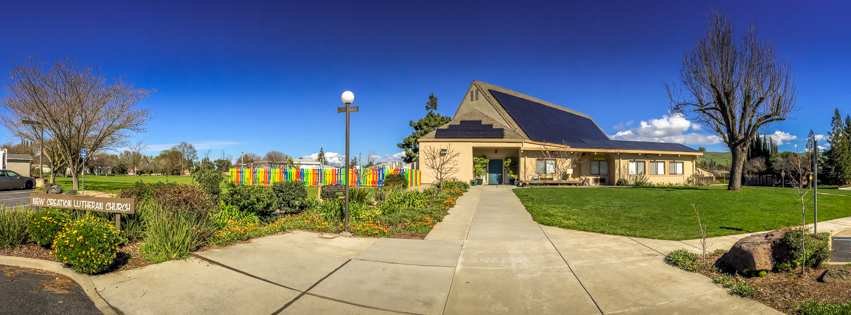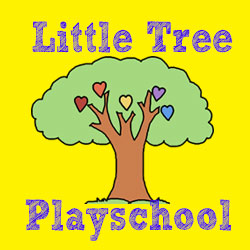
New Creation is about introducing people to the all that a life with Christ can bring — and then challenging and encouraging them to live a life of significance. Whether you have never been to church, you’ve been hundreds of times, or you are returning from a long absence, we invite you to get acquainted with New Creation. Please spend a few minutes to browse the site for more details.
Q. What style of service do you offer?
A. Our church services are casual, with mostly-contemporary praise music and an occasional traditional hymn. Some people dress up for church and others wear jeans or shorts. We sing a few songs, and then hear a few Bible readings, an encouraging and relevant message from the pastor, and some prayers. Communion is served, and we share a few announcements. There are cookies and lots of hot, fresh coffee every week.
Q. Where do I go when I get there?
A. Our church entrance is easily visible from our parking lot. On Sunday mornings, you’ll find greeters who are happy to help you find the right place for your children, teenagers, and yourselves.
Q. What should I wear?
A. When you attend New Creation you’ll find that there is no uniform way to dress. Some people dress up, and most people dress very comfortably. You’ll see people wearing t-shirts, jeans, dresses, etc.
Q. How do I meet people?
A. Join us for coffee before or after church. Another way is to take part in one of our ministries or small groups. There are many different ways to get involved. For more info take a look at the Ministries menu, above.
Q. Can I bring my children with me into church?
A. Yes. Kids are always welcome in church. During the service the children and teens will be excused to Sunday School. Your children or teens are welcome to join in, with a program designed to teach them the Bible on their level or, if you would prefer them to remain with you, the greeters can give you an activity bag with coloring sheets and colored pencils.
Q. Are there other children at New Creation?
A. Yes! Children of all ages attend New Creation and the numbers continue to grow. We often have a toddler or two in the nursery, attended to by a certified caregiver (or one of the other moms). Sometimes others will also stay with their parents for the worship service. Grade school kids and Jr. High kids meet in our fellowship hall, outside (on nice days), or sometimes in our office. The teens meet in our Youth Center (the 5th wheel trailer, out front).
Q. What is the current demographic in the community?
A. We are a community of about 70 people. We have people of all ages and backgrounds. Many of us indentify ourselves as Lutherans, many come from other faith communities, some consider themselves agnostic, and some are still discovering (or undecided).
Q. Do you expect me to give money?
A. No. We do collect an offering during our service. However, we expect nothing of you except to come and relax and enjoy the morning.
Q. Is New Creation part of a denomination?
A. Yes. New Creation is a member of the Evangelical Lutheran Church in America (ELCA). The “Evangelical” in our name has its roots in the Greek word euangelion meaning “gospel” or “good news.” This means that we believe in the Good News of God’s saving love. Jesus brought us this joyful message. “Evangelical” is often used in current media to mean “fundamentalist.” This does not apply to New Creation Church or the ELCA.
Q. Is everyone that attends New Creation Lutheran?
A. No, while we are a Lutheran church, and generally operate from that perspective, people of all backgrounds attend NCLC. Not everyone that attends is Lutheran.
Q. How do I join New Creation Church?
A. Talk to Pastor Cristina! She conducts new member programs intermittently and can let you know. info@NewCreationChurch-SJ.org. Active members of other Lutheran congregations usually need only to transfer their membership.
Q. Who is Jesus Christ?
A. Jesus is God’s son, sent by God to become human like us. In his life and being he broke through the prison of sinfulness and thus restored the relationship of love and trust that God intended to exist between himself and his children. Though he is eternal, present with God at the beginning of time, he was born on earth of a virgin, by the power of the Holy Spirit. Jesus was at once truly God and truly human.
The man, Jesus of Nazareth, lived and died in Palestine during the governorship of the Roman administrator Pontius Pilate; we believe him to be the Messiah chosen by God to show God’s love for the world. Jesus is God, yet with all the limitations of being human. His relationship to God, however, was not one of sin but rather of perfect obedience to God’s will.
Jesus was condemned to death on the cross. But death could not contain him. On the third day after his execution, the day Christians observe as Easter, Jesus appeared among his followers as the risen, living Lord. By this great victory God has declared the Good News of reconciliation. The gap between all that separates us from our Creator has been bridged.
Q. How does New Creation Relate to the Bible?
A. To borrow a phrase from Luther, the Bible is “the manger in which the Word of God is laid.” The Bible is a collection of writings, spanning several centuries, penned by many different people, which relate the over-arching story of God’s relationship with the Hebrews and early Christian people. The Bible is not a science or history textbook. The oldest parts of the Bible began as oral traditions, stories that were handed down through generations of Jews, relating the earliest parts of their story and the laws that bound them together as a people. There are also accounts of the life of Jesus (“The Gospels”) and his followers, written in the first century after his death. There are prayers, songs, and letters. ELCA Lutherans believe in the holy inspiration of the Bible’s authors – and also consider a historical perspective when studying Biblical passages. Who wrote the text? What world were they living in? Who was the intended audience? And what were they hoping to convey to that audience?
The earliest Christians were a ragtag bunch of congregations, struggling with differing ideas, challenges, and goals. The New Testament in the Bible contains letters written to these outlying churches. For the most part, New Creation Church and the ELCA (and many other mainline churches in the US) use the New Revised Standard Version (NRSV). While the language may not be as “flowery” as, say, the King James Version that some of us grew up with, the translation (from the original Hebrew, Greek, and Aramaic) is scholarly, yet clear and easy to understand. Occasionally, at the discretion of the Pastor, we may use other translations in our services at New Creation. These might be the New Living Translation, The Message, or the Good News Bible, among others.
Q. What Do Lutherans Believe About Creation?
A. Lutherans believe that God is Creator of the universe. God’s artistry in creation is ancient and brand new. We see God’s blessings every day and know we are continually re-created. We are charged with caring reverently for God’s creation.
Caring for Creation: Vision, Hope and Justice, an ELCA Statement on caring for God’s creation, is available here.
Q. Where Do Lutherans Stand on the Question of Sin?
A. Lutherans believe that all people live in a condition which is the result of misused freedom. “Sin” isn’t so much individual acts of wrongdoing as fractured relationships between the people of creation and God. By the standard of the Law (the Ten Commandments are a classic summary), God expresses his just and loving expectations for creation, and our failure to live up to those expectations reveals our need for God’s mercy and forgiveness.
Q. What is a Sacrament?
A. A sacrament is an act wherein the presence of God is brought palpably into the humanity of us. (One might say it’s where Heaven and Earth collide.) Lutherans observe two – Baptism and Communion.
Baptism – In baptism, the Grace of God is freely given, and the Baptized are lovingly brought into the full community of the Church. In the Lutheran Church, people of all ages are baptized. At New Creation Church, we baptize with a basin of holy water, during a Sunday church service. Baptisms are a permanent gift from God and never “wear out” or expire – an infant or childhood baptism lasts forever.
Communion – In Holy Communion (also called the Lord’s Supper or the Eucharist), those who come to the table experience the real presence of God’s forgiveness and mercy in the bread and the wine. Tradition holds that all those who have gone before us gather in spirit at this table, in this ancient practice spanning centuries and crossing the geographical, cultural, and political boundaries that may otherwise separate us. At New Creation Church, there are no restrictions on who may take Communion. Jesus would include everyone at the table, and so do we. If there is any reason you prefer not to take the bread and wine, you may come up in the line for a blessing, or you may simply remain in your seat. The choice is yours. Gluten-free, low-allergy, and non-alcoholic options are always available.
Q. Do Lutherans Believe in Life After Death?
A. While there is much we do not and cannot know about life beyond the grave, Lutherans do believe that life with God persists even after death. Judgment is both a present and future reality, and history moves steadily towards God’s ultimate fulfillment.
This of course is a great mystery, and no description of what life may be like in any dimension beyond history is possible. Anxiety for the future is not a mark of faith. Christians should go about their daily tasks, trusting in God’s grace and living a life of service in God’s name.
Q. What is “The Church?”
A. Lutherans believe that they are a part of a community of faith that began with the gift of the Holy Spirit, God’s presence with the people, on the day of Pentecost. The church, regardless of the external form it takes, is the fellowship of those who have been restored to God by Christ. Indeed, to be called into fellowship with Christ is also to be called into community with other believers.
The church is essential to Christian life and growth. Its members have no claim on human perfection. The church exists to proclaim the living Word of Christ and give itself to the world in deeds of service and love. Most Lutherans recognize a wider fellowship of churches and are eager to work alongside them in ecumenical (inter-faith) ministries and projects.
Q. Why a Lutheran church?
A. Martin Luther (1483-1546) is known as the Father of Protestantism. He had studied to become a lawyer before becoming an Augustinian monk in 1505, and was ordained a priest in 1507. While studying in pursuit of a Doctor of Theology degree, he discovered significant differences between what he read in the Bible and the theology and practices of the church. On October 31, 1517, he posted a challenge on the church door at Wittenberg University to debate 95 theological issues. Luther’s hope was that the church would reform its practice and preaching to be more consistent with the Word of God as contained in the Bible.
What started as an academic debate escalated to a religious war, fueled by anger on both sides. As a result, there was not a reformation of the church but a separation. “Lutheran” was a name applied to Luther and his followers as an insult but adopted as a badge of honor by them instead.
Martin Luther’s guiding principle was that we are saved by the Grace of God alone, not by anything we do or by money we pay. He believed in bringing the language and music of the people into worship, so they could understand and relate to the message.
Many Lutherans still consider themselves as a reforming movement within the Church catholic, rather than a separatist movement, and Lutherans have engaged in ecumenical dialogue with other church bodies for decades. In fact, the Evangelical Lutheran Church in America has entered into cooperative “full communion” agreements with several other Protestant denominations.



 Our Latest Updates on
Our Latest Updates on